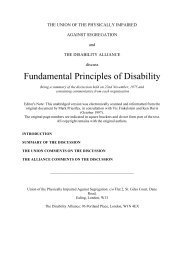Global-Report-Living-Colour-dr2-2
Global-Report-Living-Colour-dr2-2
Global-Report-Living-Colour-dr2-2
You also want an ePaper? Increase the reach of your titles
YUMPU automatically turns print PDFs into web optimized ePapers that Google loves.
Inclusive Communities = Stronger Communities<br />
GLOBAL REPORT ON ARTICLE 19: THE RIGHT TO LIVE AND BE INCLUDED IN THE COMMUNITY<br />
65<br />
‰ State Sponsored Residential Options are<br />
Segregated and “Institutional”<br />
When families break down or are unable to care for a<br />
person with an intellectual disabilities, state<br />
sponsored supports and services are tied to<br />
residential facilities that are institutional in structure,<br />
and segregated or isolating in the way they are<br />
delivered. Where people with intellectual disabilities<br />
are admitted to institutions our members report that<br />
usually there is not even a process for consulting the<br />
person. The breakdown of families is often the result<br />
of the failure of governments and communities to<br />
adequately support families and individuals to the<br />
point of crisis. A mother in Canada expressed her<br />
frustration with the lack of supports provided to<br />
enable families to allow their sons and daughters with<br />
intellectual disabilities to grow-up at home, “Faced<br />
with inadequate services and supports, parents are<br />
essentially being told that unless we can find a way to<br />
do it all ourselves, our choices are to turn our kids<br />
over to the Children’s Aid or to the criminal justice<br />
system. Really? Is that the best we can do?”<br />
‰ Daily <strong>Living</strong> Supports Attached to Real Estate<br />
Where some efforts have been made to develop<br />
supports and services which are physically in the<br />
community, many continue to be separate and<br />
isolating either because services are attached to<br />
specific homes, apartments or facilities or because<br />
instead of allowing people to use the housing options<br />
which are available to others in the community,<br />
governments and community agencies continue to<br />
create separate “disability-specific” options specifically<br />
for people with disabilities. In the Netherlands, the<br />
eligibility criteria for support needs were identified as<br />
a significant barrier to access residential options.<br />
Under the General Act on Extraordinary Healthcare<br />
Costs, “one group is not entitled for residential care<br />
and receives support based on individual needs. One<br />
group is considered to be in high need for support<br />
KENYA “I am not worried because I<br />
know her cousin will treat her well<br />
and knows how to communicate with<br />
Damaris. She is still nearby and we<br />
talk on the phone every day so I<br />
would know if anything was wrong.<br />
As well as learning hairdressing at her<br />
cousin’s home salon Damaris is<br />
helping to take care of the two<br />
children and learning about family life<br />
and looking after a home Ndumberi in<br />
Kiambu county.”<br />
“Not everyone accepts people with<br />
disabilities in the communities where<br />
we live. Some people who do not<br />
know people with intellectual<br />
disabilities treat them as dirty people<br />
and not all teachers accept them in<br />
classrooms. We want our children to<br />
be included in the community.”<br />
In addition many of the female selfadvocates<br />
commented that they worry<br />
about cases of rape and are scared to<br />
go out. They also reported being<br />
pressured into sexual activity by their<br />
peers. Such sexual violence and<br />
exploitation is indicative of a lack of<br />
respect within the community.



